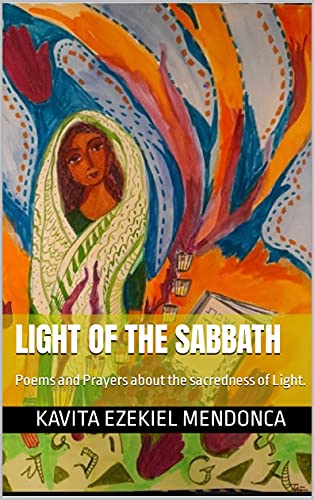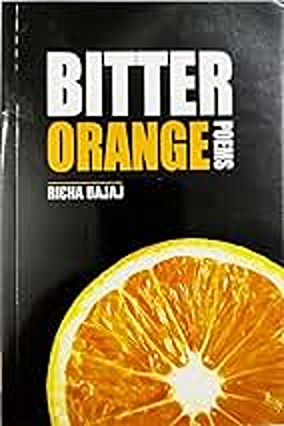Basudhara reviews Kavita Ezekiel Mendonca’s ‘Light of the Sabbath’, her latest chapbook, exclusively for Different Truths.

All around us, light is ubiquitous. And yet, how much of this light penetrates our consciousness? How many times do we, voluntarily, awaken to light, admit its clarity into our souls, are willing to, single-mindedly, pursue its being, and allow ourselves to be unquestioningly transformed by it? Very few of us, we would confess. In fact, the contrary often holds true for light – it is pursued when it is most invisible. Being taken for granted, light’s everyday presence around us easily goes unnoticed. It is merely a part of the backdrop, something that, given time and season, must exist. We shrug at its being and move on. However, the moment this privilege is taken away, we feel restless, indignant, wronged.
Light as Metaphor
At an existential level, light manifests itself as a metaphor for many feelings – joy, goodness, contentment, gratitude, love, kinship, hope, faith, and more. Both the world and the spirit’s geography are revealed through light. Being indeterminate and evasive by nature, light can always be lost. Being omnipresent, it will always be found, if well-sought. To heighten one’s perception to light’s fragility and to vest faith in its omnipresence, requires a consciousness that is, to a considerable degree, transcendent. To meditate on light will involve a resolute turning away from the meanness of time, the ingratitude of our days and the world’s shape-shifting errors. To elevate such meditations into memorable poetry will call for a resonance to light’s luminosity. Kavita Ezekiel Mendonca, as any reader of Light of the Sabbath will realise, has effectively done them all.
“Growing up, Light was an important subject of conversation in my home…”
“Growing up, Light was an important subject of conversation in my home – how to read in the best light, how to write with proper lighting, opening the windows and curtains to the morning light, appreciating light in all the various forms of illumination that invigorated one’s being. It became something of a sacred consciousness,” writes Mendonca in her note ‘From the Poet’s Desk’. These poems which she describes as “an attempt to discover my Jewish roots, and the meaning and impact my upbringing has in forming my world view and my life today” constitute a compound inquiry on the idea of light on many planes – religious, spiritual, familial, ethical, moral, emotional, and practical. One will notice that I have abstained from using the word ‘intellectual’ here and rightly so, for Mendonca’s poems, in myriad ways, offer the reader a respite from the intellectual. There is no syllogism here, no ratiocination, no point to be enforced by example or argument. There is no conscious linguistic artistry, no posture, and absolutely no irony in her poetry. Here is an intense soul-flowering of the lyric and a spontaneous expression of the profound musings of a soul that is in continuous dialogue with its many temporal selves.
The theme of identity looms large over the collection. Many of the poems here are attempts to establish a connection not only across her Canadian present and Indian past but also, across generations of her Bene-Israel Jewish community in India. In the poem ‘Shipwreck’, Mendonca attempts to condense a narrative of the community’s arrival on the subcontinent:
The ship struck a rock The ship broke, God’s rock stood firm It carried my people to a new land A different destiny. […] Settling in nearby villages Blending into the landscape They pressed the oil, became oil pressers Of the local seed, Saturday oil pressers, Shanwar Telis, my ancestors […] I am from the same seed […] I survive Like my ancestors. Pressing seeds into verse To preserve a story of survival Not just on Saturdays.
‘Alibaug’ is another rich tribute to her ancestors and the simple, pre-industrialized way of life that shall never be recovered again:
I miss Alibaug The flickering lanterns, sleeping on mats, eating from *thalis I miss Alibaug The hushed whispers between cousins I don’t know when I can return To the land of my ancestors The land of the Shanwartelis, the Oil pressers
A Keen Eye
Like her late father, Nissim Ezekiel, Kavita Ezekiel Mendonca’s poetry exhibits a keen eye for detail as she attempts to record the world around her as she sees it – with a complete acceptance of its follies and sans rancour. Her chosen subject in this slim collection of twenty-eight poems is, as she puts it, her “Indian-Jewish heritage” and “the warm memories of growing up with the customs and traditions of the culture, faith and personalities of my parents, grandparents, and extended family.” Narrativised in these poems are animated recollections of religious celebrations, family visits, love for close relatives and beloved possessions, and the ways in which the past and the present are deeply entwined together. ‘The Ballad of Little Ma’, for instance, celebrates the love and resilience of the poet’s maternal grandmother:
Little Ma had thirteen children, Nine survived, one was my mother, The rest were the village that raised me, Loving, doting, aunts and uncles, Saviors from a strict mother. I wondered how Ma’s small frame carried so many children in her tiny body. I carried two, my body not so little as hers.
‘China Grass Halwa’ pays an affectionate tribute to an aunt whose house had little room and not many belongings but whose heart, in its affection and generosity, was immense. In ‘Chain of Events’, the poet amusedly traces the whimsical journey of a gold chain across generations till it is finally found in her closet – a heirloom that preserves intact her connection with her lost family. ‘Give me Oil in my Lamp’ is another heart-warming poem that describes the poet’s childhood visits to the synagogue with her paternal grandmother and the way her grandmother would give her a Jewish name, Elizabeth, only in order to sign the receipt for filling oil in the lamp.
There is the nostalgic light of cheerful memories, the religious light of the Sabbath…
Light emerges as a significant trope in these poems in all its metaphoric, symbolic, and sensory forms. There is the nostalgic light of cheerful memories, the religious light of the Sabbath, the ritualistic light of the lamp burning in the synagogue, the physical light of the sunrise and twilight, the spiritual light of the Jewish blessing ‘Mazel Tov’ and the immortal light of the Muse. ‘How to light up a poem’, for instance, is a meta literary piece that in ways akin to Ezekiel’s ‘Poet, Lover, Birdwatcher’, metaphorically describes the art of poetic creation. In images that are strongly romantic and ecocentric, Mendonca conjures the gentle art of writing a poem:
Gently petition the moon for some moonbeams, scatter them gently on the path Implore the sun for a ray or two, scatter deliberately along the way Ask the trees for shadows and silhouettes, brush the path with shades of these Strike up a conversation with the trees, soon there will be a dialogue.
However, the best part of a poem, as Mendonca agrees, is that which cannot consciously be birthed. Certain things have to be left to the mystery and magic of creation. Hence, the poet’s advice:
If after doing all these things you do not manage to light up the poem Don’t worry, when the light wants to come in, It will knock.
However, to say that these poems have totally vanquished the dark would be untrue.
However, to say that these poems have totally vanquished the dark would be untrue. Watermarked by the memory of the Holocaust and the large-scale historical deprivation of Jews worldwide, these poems are also acts of what Saranya Subramaniam in her Foreword to the collection, calls “archival activism”. Consider the haunting memory of hunger in ‘The last Slice’ where the poet, on the verge of throwing the last thin slice of bread into the garbage bin, recalls the hunger of Jewish prisoners:
Remembered them, the doomed prisoners They got no bread, often just crumbs The same crumbs, the ones I shook out Out of the toaster, to prevent a toaster fire. I was not there, but I saw in visions Their crumbs with the snow boot marks, Should the fallen bread kiss the ground
By trying to go back in time, place, and culture, Mendonca’s journey towards understanding her Jewish roots is equally an activist journey to archive a way of life and living that is fast fading from public memory. “Remembering,” writes Susan Sontag in Regarding the Pain of Others, “is an ethical act, has ethical value in and of itself.” Remembering is also, I would add, a political act, for in the field of memory, the politics of inclusion and exclusion has significantly framed power-dominated constructions of the mainstream and the margins. To keep personal memory alive and to pass it on to the world through poetry will always be political – the courageous and deeply humane act of voicing what is innately precarious, what can easily be lost.
Book Cover sourced by the reviewer





 By
By
 By
By
 By
By
 By
By
Looking forward to this book.
What really impresses me is the poet’s intent of not intellectualizing the poetry; for the most difficult task is to keep it simple; beautiful; accessible; connectible; memorable & memorizable, heart to heart. Thank you, dear reviewer, Ms.Basudhara Roy, the article’s flow made it at once appealing.
Thank you very much for making time to read this and for your valuable feedback. I hope the book makes more friends in the world!
Congratulations to the Poet and the reviewer! It captures different facets of the poems. It gives healing balms for the world sick with mad competitions and rush. Enjoyable read!
Thank you for your valuable reading! I am glad the review helps draw attention to the book’s wonder.
A very perceptive review that lays bare the promise of the book. Congrats to the poet. Is this book available online?
Thank you for your valuable reading! Means a lot. Yes, this book is available as a kindle version on Amazon. It is also coming out as a paperback in the US and Canada soon.